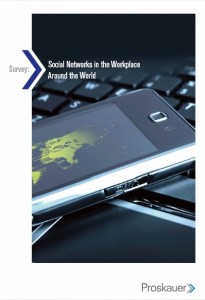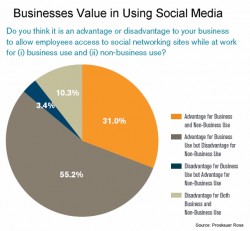 If you recruit in Italy, don’t check the social networks when you background a candidate. In Spain, you can monitor the time your workers spend on social networks, if you warn them in advance you’re going to. But without their permission you can’t monitor the content.
If you recruit in Italy, don’t check the social networks when you background a candidate. In Spain, you can monitor the time your workers spend on social networks, if you warn them in advance you’re going to. But without their permission you can’t monitor the content.
And do you have a company policy regarding social networking? Only 55 percent of the companies do, according to a survey by the International Labor & Employment Group at Proskauer Rose.
The high-powered law firm conducted what it describes as an “informal survey on emerging trends and practices on the use of social media in the workplace,” finding that 76 percent of the 120 responding companies use social media for business purposes.
The results of the 10-question survey are supplemented by brief summaries of rules and regulations around the world, which, as in the U.S., can be fairly loose, or, as in Italy, so restrictive that employers can’t even monitor what their workers are doing on company time using company equipment. (Employers there can, however, prohibit the use of social networking sites during work hours.)
Rather than rely on existing company policies, Proskauer Rose says, “businesses need to have distinct and specific social media policies and practices in order to harness the benefits and minimize the risks these new media present.”
 It’s telling that although 55 percent found value in the business use of social media during work hours, but not in its personal use, a significant 31 percent found an advantage in allowing both business and personal use.
It’s telling that although 55 percent found value in the business use of social media during work hours, but not in its personal use, a significant 31 percent found an advantage in allowing both business and personal use.
The survey also found 31 percent of the companies took disciplinary action against an employee in connection with their use of social networks, while 43 percent have faced an issue with misuse of social networks.
Proskauer suggests companies consider three factors whether they use social networks for recruitment and selection or in disciplinary action:
- Weigh carefully the value of the information gleaned from social media, since it may be inaccurate, dated, or even the work of someone else;
- Be mindful of the data privacy requirements of your jurisdiction. Some locales — Hong Kong, for instance — require the filing of a written Personal Information Collection Statement before monitoring can be done;
- Avoid relying on information that creates a risk of discrimination. “It is possible,” says the firm, “to envisage situations where someone is treated less favorably by reason of a protected characteristic, or a condition is imposed which has disparate impact on people of a particular class.”
U.S. companies should pay particular attention to that latter point. While the U.S. has nothing even remotely approaching the rules in Europe and elsewhere, the National Labor Relations Board is taking a close look at discipline meted out by employers over social media use.
The Workplace Privacy, Data Management & Security Report published by the Jackson Lewis firm, reported NLRB Acting General Counsel Lafe E. Solomon telling a labor conference last month that every one of the board’s 52 regional offices has at least one pending case involving social media issues in some fashion.
Two of the most recent complaints against companies for terminating employees over their Facebook postings were filed in May by the Buffalo and Chicago offices.
In Buffalo, five workers at a non-profit were terminated when they posted complaints about working conditions. The Facebook postings amounted to “protected concerted activity,” said the NLRB, “because it involved a conversation among coworkers about their terms and conditions of employment, including their job performance and staffing levels.”
More curious is the Chicago case, which arose when a BMW salesman complained that his dealership served hot dogs and water during a promotional event. That, too, the NLRB considered protected activity, reasoning that the posting reflected the feelings of other sales staff about the impact on their commissions.
In Canada, the British Columbia Labour Relations Board seems more employer generous. Last fall it upheld the firing of two workers who posted highly offensive comments to Facebook during a union certification push. The board said it didn’t matter that the employees did their posting during their off hours and away from the work site.
As Proskauer attorneys wrote, in commenting on the Canadian case and another involving a fired pub worker in Britain, “it would be prudent for multinational employers to review their policies on the use of social media sites (or to put policies in place if they do not yet have any).”